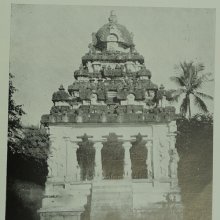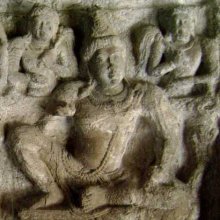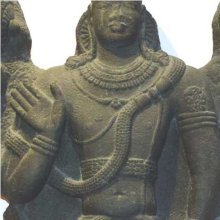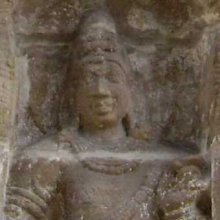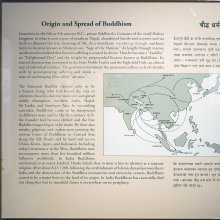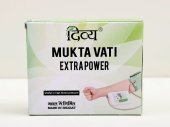Mukta, Muktā: 39 definitions
Introduction:
Mukta means something in Buddhism, Pali, Hinduism, Sanskrit, Jainism, Prakrit, the history of ancient India, Marathi, Hindi, biology, Tamil. If you want to know the exact meaning, history, etymology or English translation of this term then check out the descriptions on this page. Add your comment or reference to a book if you want to contribute to this summary article.
Alternative spellings of this word include Mukt.
Images (photo gallery)
In Hinduism
Ayurveda (science of life)
Rasashastra (Alchemy and Herbo-Mineral preparations)
Source: Wisdom Library: Rasa-śāstraMuktā (मुक्ता) refers to “pearls”. It is used in Ayurvedic literature such as the Rasaprakāśasudhākara (Sanskrit book on rasaśāstra, or ‘Indian medicinal alchemy’).
Source: PMC: Standardization and quality control parameters for Muktā Bhasma (calcined pearl)Raw Muktā is chemically calcium carbonate in aragonite form, which after Ayurvedic procedures of calcinations is converted into more stable form of calcite. SEM images clearly show reduced particle size of the Bhasma, which indicates absorption and assimilation of the drug into the body system at low doses. It can easily be concluded that Ayurvedic procedures of śodhana and Māraṇa, etc., are ancient techniques of nanoscience as the particles of final product MB comes under the range of 100 nm. Presence of essential micronutrients and permissible limits of heavy metals proves the compound to be safe as well as efficacious for internal administration.
Unclassified Ayurveda definitions
Source: archive.org: Vagbhata’s Ashtanga Hridaya Samhita (first 5 chapters)Mukta (मुक्त) refers to “pearls”, mentioned in verse 3.52-53 of the Aṣṭāṅgahṛdayasaṃhitā (Sūtrasthāna) by Vāgbhaṭa.—Accordingly, “[...] when hungry, one shall turn to bitter, sweet, astringent, and light food, [...]; to water [...] devoid of dirt, (and) destructive of dirt [...] (and that is) neither causative of effusions nor rough, (but) nectar-like among the beverages etc.; (and)—beautifully adorned) with sandal, cuscus, camphor, pearls [viz., mukta], garlands, and (fine) clothes— [...]”.
Note: Mukta (“pearl”) has been translated by mu-tig chun (“pearl ornament”), whereas sraj (“garland”) has been paraphrased by ’phyaṅ-(’)phreṅ, which properly means “dangling wreath”. For ’phyaṅ (miscarved ’phyan in P) CD read ’phyaṅs (miscarved ’phyeṅs in C), the perfect participle being, however, less satisfactory in this connection.
Source: eJournal of Indian Medicine: Jajjaṭa’s Nirantarapadavyākhyā and Other Commentaries on the CarakasaṃhitāMuktā (मुक्ता) (or Yuktā) is a synonym of Rāsnā, which refers to a medicinal plant mentioned in the 7th-century Nirantarapadavyākhyā by Jejjaṭa (or Jajjaṭa): one of the earliest extant and, therefore, one of the most important commentaries on the Carakasaṃhitā.—Synonyms of Rāsnā: Rosanā, Vāyasuraī, Atirasā (?)[sic], Elāparṇī, Muktā (Yuktā), Surabhi; Pluchea lanceolata Oliver and Hiern.—(Cf. Glossary of Vegetable Drugs in Bṛhattrayī 337-338, Singh and Chunekar, 1999).—Pluchea lanceolata (DC.) C.B.Clarke.—(Cf. The Plant List, A Working List of All Plant Species, Royal Botanic Gardens, Kew and Missouri Botanical Garden).

Āyurveda (आयुर्वेद, ayurveda) is a branch of Indian science dealing with medicine, herbalism, taxology, anatomy, surgery, alchemy and related topics. Traditional practice of Āyurveda in ancient India dates back to at least the first millenium BC. Literature is commonly written in Sanskrit using various poetic metres.
Arthashastra (politics and welfare)
Source: Exotic India: Nitiprakasika of Vaisampayana (A Critical Edition)Mukta (मुक्त) are the weapons to be released completely for striking, such as the bow and the arrow. (see Vasiṣṭha-dhanurveda)

Arthashastra (अर्थशास्त्र, arthaśāstra) literature concerns itself with the teachings (shastra) of economic prosperity (artha) statecraft, politics and military tactics. The term arthashastra refers to both the name of these scientific teachings, as well as the name of a Sanskrit work included in such literature. This book was written (3rd century BCE) by by Kautilya, who flourished in the 4th century BCE.
Purana and Itihasa (epic history)
Source: archive.org: Shiva Purana - English TranslationMukta (मुक्त) refers to a “liberated soul”, according to the Śivapurāṇa 2.2.23. Accordingly as Śiva said to Satī:—“[...] O Goddess Satī, listen, I shall explain the great principle whereby the remorseful creature becomes a liberated soul (mukta). O great Goddess, know that the perfect knowledge is the great principle—the consciousness that ‘I am Brahman’ in the perfect intellect where nothing else is remembered”.
Source: Cologne Digital Sanskrit Dictionaries: The Purana Index1a) Mukta (मुक्त).—(Paulaha)—a sage of the epoch of Bhautya Manu.*
- * Brahmāṇḍa-purāṇa IV. 1. 113.
1b) One released from saṃsāra knows his own self and assumes the shape foreign to the everyday world.*
- * Vāyu-purāṇa 16. 21-2; 102. 76-7, 105.
2) Muktā (मुक्ता).—A main stream of Śālmalidvīpa.*
- * Viṣṇu-purāṇa II. 4. 28.
Mukta (मुक्त) is a name mentioned in the Mahābhārata (cf. VI.52.9) and represents one of the many proper names used for people and places. Note: The Mahābhārata (mentioning Mukta) is a Sanskrit epic poem consisting of 100,000 ślokas (metrical verses) and is over 2000 years old.

The Purana (पुराण, purāṇas) refers to Sanskrit literature preserving ancient India’s vast cultural history, including historical legends, religious ceremonies, various arts and sciences. The eighteen mahapuranas total over 400,000 shlokas (metrical couplets) and date to at least several centuries BCE.
Dhanurveda (science of warfare)
Source: Shodhganga: Rajadharma in the Mahabharata (dhanurveda)Mukta (मुक्त) refers to the first class of weapons, according to the second chapter of the Nītiprakāśikā:—The weapons which can be thrown is called mukta, such as arrows. Twelve arms are included in the Mukta class.
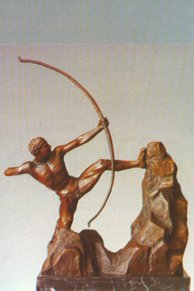
Dhanurveda (धनुर्वेद) refers to the “knowledge of warfare” and, as an upaveda, is associated with the Ṛgveda. It contains instructions on warfare, archery and ancient Indian martial arts, dating back to the 2nd-3rd millennium BCE.
Vaishnavism (Vaishava dharma)
Source: Pure Bhakti: Brhad BhagavatamrtamMukta (मुक्त) refers to:—A liberated soul. (cf. Glossary page from Śrī Bṛhad-bhāgavatāmṛta).

Vaishnava (वैष्णव, vaiṣṇava) or vaishnavism (vaiṣṇavism) represents a tradition of Hinduism worshipping Vishnu as the supreme Lord. Similar to the Shaktism and Shaivism traditions, Vaishnavism also developed as an individual movement, famous for its exposition of the dashavatara (‘ten avatars of Vishnu’).
Vastushastra (architecture)
Source: OpenEdition books: Architectural terms contained in Ajitāgama and RauravāgamaMukta (मुक्त) refers to “closed (speaking of a building) § 3.40.”.—(For paragraphs cf. Les enseignements architecturaux de l'Ajitāgama et du Rauravāgama by Bruno Dagens)

Vastushastra (वास्तुशास्त्र, vāstuśāstra) refers to the ancient Indian science (shastra) of architecture (vastu), dealing with topics such architecture, sculpture, town-building, fort building and various other constructions. Vastu also deals with the philosophy of the architectural relation with the cosmic universe.
Shaivism (Shaiva philosophy)
Source: Google Books: Manthanabhairavatantram (shaivism)Muktā (मुक्ता) refers to “pearls”, according to the Śrīmatottara-tantra, an expansion of the Kubjikāmatatantra: the earliest popular and most authoritative Tantra of the Kubjikā cult. Accordingly, “O goddess, Svacchanda is in the middle, within the abode of the triangle. Very powerful, he has five faces with three times five flaming eyes. [...] He sits on a great lotus and is adorned with a belt on his hips. He is adorned with small bells and a garland of gems. There are anklets on his feet and they are well adorned with necklaces of pearls [i.e., muktā-mālā-svalaṃkṛta]. He sits on Ananta as a seat and is like heated gold. On Ananta’s seat are seventy billion mantras. He is beautiful, divine, (white) like the stars, snow and the moon.]. [...]”.

Shaiva (शैव, śaiva) or Shaivism (śaivism) represents a tradition of Hinduism worshiping Shiva as the supreme being. Closely related to Shaktism, Shaiva literature includes a range of scriptures, including Tantras, while the root of this tradition may be traced back to the ancient Vedas.
Jyotisha (astronomy and astrology)
Source: Wisdom Library: Brihat Samhita by Varahamihira1) Mukta (मुक्त) means “without” or “freed from” (e.g., free from the vices of the Kaliyuga), according to the Bṛhatsaṃhitā (chapter 8), an encyclopedic Sanskrit work written by Varāhamihira mainly focusing on the science of ancient Indian astronomy astronomy (Jyotiṣa).—Accordingly, “When Jupiter (bṛhaspati) reappears at the beginning of the constellation of Dhaniṣṭhā in the month of Māgha, the first year of the cycle of 60 years of Jupiter known as Prabhava commences. [...] The next year is known as Vibhava the third as Śukla, the fourth as Pramoda, and the fifth as Prajāpati: in each of these years mankind will be happier than in the next preceding year. In the same four years there will be good growth of the Śālī crop, of sugarcane, of barley and other crops in the land; mankind will be freed from all fears and they will live at peace, in happiness and without the vices of the Kaliyuga [i.e., kalidoṣa-mukta]”.
2) Muktā (मुक्ता) or Muktādvīpa refers to an island belonging to “Dakṣiṇa or Dakṣiṇadeśa (southern division)” classified under the constellations of Uttaraphālguni, Hasta and Citrā, according to the system of Kūrmavibhāga, according to the Bṛhatsaṃhitā (chapter 14).—Accordingly, “The countries of the Earth beginning from the centre of Bhāratavarṣa and going round the east, south-east, south, etc., are divided into 9 divisions corresponding to the 27 lunar asterisms at the rate of 3 for each division and beginning from Kṛttikā. The constellations of Uttaraphālguni, Hasta and Citrā represent the southern division consisting of [i.e., Muktā-dvīpa] [...]”.

Jyotisha (ज्योतिष, jyotiṣa or jyotish) refers to ‘astronomy’ or “Vedic astrology” and represents the fifth of the six Vedangas (additional sciences to be studied along with the Vedas). Jyotisha concerns itself with the study and prediction of the movements of celestial bodies, in order to calculate the auspicious time for rituals and ceremonies.
Yoga (school of philosophy)
Source: ORA: Amanaska (king of all yogas): A Critical Edition and Annotated Translation by Jason BirchMukta (मुक्त) refers to “having finished (love-making)”, according to the Haṭhapradīpikā 3.90.—Accordingly, “Pure ashes, which were produced by burning cow-dung, [should first be] placed in water. After having sex in which Vajrolī Mudrā [was performed], the woman and man, who are sitting comfortably and have finished love making (mukta-vyāpāra), [should] immediately smear their own bodies [with the ashes mixed with water]

Yoga is originally considered a branch of Hindu philosophy (astika), but both ancient and modern Yoga combine the physical, mental and spiritual. Yoga teaches various physical techniques also known as āsanas (postures), used for various purposes (eg., meditation, contemplation, relaxation).
Sports, Arts and Entertainment (wordly enjoyments)
Source: archive.org: Syainika Sastra of Rudradeva with English Translation (art)Mukta (मुक्त) refers to the “release (from bondage)”, according to the Śyainika-śāstra: a Sanskrit treatise dealing with the divisions and benefits of Hunting and Hawking, written by Rājā Rudradeva (or Candradeva) in possibly the 13th century.—Accordingly, “[...] If one’s merit is so great that one can aim at the attainment of the highest object of desire, one should give up all activities and practise complete renouncement. It is known from the Śāstras that even the enjoyment of the fruits of action causes annihilation of the fruits of activity, as in the case of the wise Saubhari, who enjoyed the objects of his senses for the release from bondage (bandha-mukta). [...]”.

This section covers the skills and profiencies of the Kalas (“performing arts”) and Shastras (“sciences”) involving ancient Indian traditions of sports, games, arts, entertainment, love-making and other means of wordly enjoyments. Traditionally these topics were dealt with in Sanskrit treatises explaing the philosophy and the justification of enjoying the pleasures of the senses.
General definition (in Hinduism)
Source: Google Books: The Hindu WorldMukta (मुक्त):—According to Śrīkaṇṭha, the muktas realize the saviśeṣa body of Śiva, and though they cannot be distinguished from brahman, they are not identical with it. Attaining the final stage means realizing śivatva and sharing the qualities of Śiva. The mukta is not only omniscient like Śiva but also independent and can assume and discard bodies at will. The muktas are also all-pervasive, but they do not share the power of Śiva to create and to destroy the world. Though they enjoy the same bliss as Śiva, there is only one lord. Śrīkaṇṭha describes the abode of Śiva as a place blazing “like millions of suns” (Śrīkaṇṭhabhāṣya 4.4.22)
In Buddhism
Mahayana (major branch of Buddhism)
Source: academia.edu: A Study and Translation of the GaganagañjaparipṛcchāMuktā (मुक्ता) refers to “pearls”, according to the Gaganagañjaparipṛcchā: the eighth chapter of the Mahāsaṃnipāta (a collection of Mahāyāna Buddhist Sūtras).—Accordingly, “[...] Then the bodhisatva, the great being Gaganagañja, having heard the Buddha’s prediction, being delighted, offered to the body of the Buddha with a net of pearls (muktā-jāla) having an immaculate and pure radiance with the value of pearls filling the three thousandfold world-system, and then he addressed himself to the Lord: ‘The knowledge of the Awakened Lords is free from any attachment or obstruction; [...]’”.
Source: De Gruyter: A Buddhist Ritual Manual on AgricultureMukta (मुक्त) refers to the “release (of lightning)” (as part of an offering ceremony), according to the Vajratuṇḍasamayakalparāja, an ancient Buddhist ritual manual on agriculture from the 5th-century (or earlier), containing various instructions for the Sangha to provide agriculture-related services to laypeople including rain-making, weather control and crop protection.—Accordingly, [as the Bhagavān teaches the offering manual of the root-heart] “[...] Having enchanted oleander creepers twenty-one times, a bracelet should be made of this. Thunderbolts will be bound everywhere [for him]. One should throw water enchanted seven times. The [lightning] will be released (mukta). [...]”

Mahayana (महायान, mahāyāna) is a major branch of Buddhism focusing on the path of a Bodhisattva (spiritual aspirants/ enlightened beings). Extant literature is vast and primarely composed in the Sanskrit language. There are many sūtras of which some of the earliest are the various Prajñāpāramitā sūtras.
Tibetan Buddhism (Vajrayana or tantric Buddhism)
Source: OSU Press: Cakrasamvara SamadhiMukta (मुक्त) refers to a “loose (roar)”, according to the Cakrasaṃvara Samādhi [i.e., Cakrasamvara Meditation] ritual often performed in combination with the Cakrasaṃvara Samādhi, which refers to the primary pūjā and sādhanā practice of Newah Mahāyāna-Vajrayāna Buddhists in Nepal.—Accordingly, “An enemy's lopped head! Pouring poison in the mouth, a sweet loose roar (svādu-mukta-nādā), Raised left above the jaws, in the most beautiful way, a face fixed in anger”.

Tibetan Buddhism includes schools such as Nyingma, Kadampa, Kagyu and Gelug. Their primary canon of literature is divided in two broad categories: The Kangyur, which consists of Buddha’s words, and the Tengyur, which includes commentaries from various sources. Esotericism and tantra techniques (vajrayāna) are collected indepently.
In Jainism
General definition (in Jainism)
Source: archive.org: Bhagavati SutraMukta (मुक्त) refers to “(one who is) liberated”, according to the Bhagavatīsūtra , book 8 chapter 5.—Accordingly, “[...] [Question].—Bhante! Does a monk who has restrained the cycles of coming and going,...till who has completed his work, acquire again, on death, the existence and other conditions of human life? [Answer].—Gautama! A monk who has restrained the cycles,...till, on death, docs not acquire the existence and other conditions of human life. [Question].—Bhante! How is he to be called? [Answer].—Gautama! He may be called Siddha, he may be called Buddha, he may be called pāragata, he may be called paramparāgata; he may be called siddha, buddha, mukta, nibṛtta [i.e., parinirvṛta], anta-kṛta and sarva-dukkha-prahīṇa”.
Source: Encyclopedia of Jainism: Tattvartha Sutra 2: the Category of the livingMukta (मुक्त, “liberated”) refers to one of the two types of jīva (sentients, soul), according to the 2nd-century Tattvārthasūtra 2.10.—What is meant by pure or liberated (mukta) state? The state which is completely free from kārmika bondage or transmigration is called pure state. Who is a liberated soul? The soul which is free from the eight types of karmas and attains the state of siddha is called pure soul.
Source: The University of Sydney: A study of the Twelve ReflectionsMukta (मुक्त) refers to “liberation”, according to the 11th century Jñānārṇava, a treatise on Jain Yoga in roughly 2200 Sanskrit verses composed by Śubhacandra.—Accordingly, “When this [living soul] thinks, because of delusion, about unity with objects of the senses which are immovable and other than immovable then he binds himself with his own [action]. Contrary to that, he may obtain liberation [com.—liberated (muktaḥ), because of the absence of unity with objects of the senses (arthaikyābhāvāt)] . When I, for whom confusion has gone, am the one who has attained solitariness, then certainly the bondage of life is destroyed merely of its own accord”.
Synonyms: Śivi.

Jainism is an Indian religion of Dharma whose doctrine revolves around harmlessness (ahimsa) towards every living being. The two major branches (Digambara and Svetambara) of Jainism stimulate self-control (or, shramana, ‘self-reliance’) and spiritual development through a path of peace for the soul to progess to the ultimate goal.
India history and geography
Source: Cologne Digital Sanskrit Dictionaries: Indian Epigraphical GlossaryMuktā.—(BL), epithet of a grant; a grant; possibly Arabic mukhta. Note: muktā is defined in the “Indian epigraphical glossary” as it can be found on ancient inscriptions commonly written in Sanskrit, Prakrit or Dravidian languages.

The history of India traces the identification of countries, villages, towns and other regions of India, as well as mythology, zoology, royal dynasties, rulers, tribes, local festivities and traditions and regional languages. Ancient India enjoyed religious freedom and encourages the path of Dharma, a concept common to Buddhism, Hinduism, and Jainism.
Biology (plants and animals)
Source: Google Books: CRC World Dictionary (Regional names)Mukta in India is the name of a plant defined with Pluchea lanceolata in various botanical sources. This page contains potential references in Ayurveda, modern medicine, and other folk traditions or local practices It has the synonym Berthelotia lanceolata DC. var. senegalensis (among others).
Example references for further research on medicinal uses or toxicity (see latin names for full list):
· Annals of the Missouri Botanical Garden (1994)
· Pakistan Journal of Botany (1988)
· Flora of Tropical Africa (1877)
· Fl. Egypt (2002)
· Prodromus Systematis Naturalis Regni Vegetabilis (1836)
· Flora of Iran (1980)
If you are looking for specific details regarding Mukta, for example pregnancy safety, diet and recipes, extract dosage, side effects, health benefits, chemical composition, have a look at these references.

This sections includes definitions from the five kingdoms of living things: Animals, Plants, Fungi, Protists and Monera. It will include both the official binomial nomenclature (scientific names usually in Latin) as well as regional spellings and variants.
Languages of India and abroad
Marathi-English dictionary
Source: DDSA: The Molesworth Marathi and English Dictionarymukta (मुक्त).—p (S) Released, liberated, loosed, freed. 2 Par eminence. Liberated from personal existence and absorbed into the divine substance and universe-basis called brahma. 3 Discharged--a missile or projectile.
--- OR ---
muktā (मुक्ता).—f S A pearl.
Source: DDSA: The Aryabhusan school dictionary, Marathi-Englishmukta (मुक्त).—p Released; discharged.
--- OR ---
muktā (मुक्ता).—
Marathi is an Indo-European language having over 70 million native speakers people in (predominantly) Maharashtra India. Marathi, like many other Indo-Aryan languages, evolved from early forms of Prakrit, which itself is a subset of Sanskrit, one of the most ancient languages of the world.
Sanskrit dictionary
Source: DDSA: The practical Sanskrit-English dictionaryMukta (मुक्त).—p. p. [muc-kta]
1) Loosened, relaxed, slackened.
2) Set free, liberated, relaxed.
3) Abandoned, left, given up, set aside, taken off.
4) Thrown, cast, discharged, hurled.
5) Fallen down, dropped down from; विदन्ति मार्गं नखरन्ध्रमुक्तैर्मुक्ताफलैः (vidanti mārgaṃ nakharandhramuktairmuktāphalaiḥ) Kumārasambhava 1.6.
6) Drooping, unnerved; मुक्तैरवयवैरशयिषि (muktairavayavairaśayiṣi) Dk.
7) Given, bestowed.
8) Sent forth, emitted.
9) Finally saved or emancipated.
1) Ejected, spit out.
11) Deprived.
12) Absolved or emancipated (from sin or worldly existence); see मुच् (muc) also.
13) Opened, blown (as a flower); मुक्तपुष्पावकीर्णेन (muktapuṣpāvakīrṇena) (śobhitā) Rām.5.1.8.
14) Set up, established (pravartita); स दण्डो विधिवन्मुक्तः (sa daṇḍo vidhivanmuktaḥ) Rām.7.79.9.
-ktaḥ One who is finally emancipated from the bonds of worldly existence, one who has renounced all worldly attachments and secured final beatitude, an absolved saint; सुभाषितेन गीतेन युवतीनां च लीलया । मनो न भिद्यते यस्य स वै मुक्तोऽथवा पशुः (subhāṣitena gītena yuvatīnāṃ ca līlayā | mano na bhidyate yasya sa vai mukto'thavā paśuḥ) || Subhāṣ.
-ktam The spirit released from worldly existence.
--- OR ---
Muktā (मुक्ता).—
1) A pearl; हारोऽयं हरिणाक्षीणां लुठति स्तनमण्डले । मुक्तानामप्यवस्थेयं के वयं स्मरकिङ्कराः (hāro'yaṃ hariṇākṣīṇāṃ luṭhati stanamaṇḍale | muktānāmapyavastheyaṃ ke vayaṃ smarakiṅkarāḥ) Amaruśataka 138 (where muktānāṃ means also 'of absolved saints'); Śukra.4.157. (Pearls are said to be produced from various sources, but particularly from oyster-shells :karīndrajīmūtavarāhaśaṅkha- matsyāhiśuktyudbhavaveṇujāni | muktāphalāni prathitāni loke teṣāṃ tu śuktyu- dbhavameva bhūri || Malli.).
2) A harlot, courtezan.
3) Name of a plant (rāsnā).
Source: Cologne Digital Sanskrit Dictionaries: Edgerton Buddhist Hybrid Sanskrit DictionaryMukta (मुक्त).—adj.-ppp. (in Sanskrit used of fruit fallen from its stem), loose, fallen (from its stalk), of a flower: mukta- kusuma Saddharmapuṇḍarīka 103.4 (Burnouf and Kern pearls, as if muktā); the oldest Chinese translation(s) (Dharmarakṣa, dated 286 A.D.) renders loose flowers; mukta-puṣpa Karmavibhaṅga (and Karmavibhaṅgopadeśa) 31.22; 52.13; 100.11 (Lévi une simple fleur, also wrong).
--- OR ---
Muktā (मुक्ता).—Pearl, name of a daughter of Puṣya (3) of Śrāvastī: Avadāna-śataka ii.36.12 ff.
Source: Cologne Digital Sanskrit Dictionaries: Shabda-Sagara Sanskrit-English DictionaryMukta (मुक्त).—mfn.
(-ktaḥ-ktā-ktaṃ) 1. Released, liberated, loosed, let go. 2. Liberated from corporal existence, finally happy. 3. Discharged, loosed, as a weapon; this may be in two ways, as pāṇimukta thrown with the hand, as a dart, etc., and yantramukta thrown from an instrument, as an arrow from a bow, etc. n.
(-ktaṃ) The spirit released from mundane existence, and re-integrated with its divine original. f.
(-ktā) 1. A pearl. 2. A harlot. E. muc to set free, aff. kta .
Source: Cologne Digital Sanskrit Dictionaries: Benfey Sanskrit-English DictionaryMuktā (मुक्ता).— (f. of the ptcple. pf. pass. of muc), f. A pearl, [Vikramorvaśī, (ed. Bollensen.)] [distich] 153.
Source: Cologne Digital Sanskrit Dictionaries: Cappeller Sanskrit-English DictionaryMukta (मुक्त).—[adjective] released, freed from, rid of ([ablative] or [instrumental]); loosened, relaxed, fallen off or down; set free, dismissed; relinquished, given up; put off, laid aside, cast away; discharged, shed; thrown, hurled; liberated, emancipated (from sin or worldly existence).
— [feminine] muktā pearl.
Source: Cologne Digital Sanskrit Dictionaries: Monier-Williams Sanskrit-English Dictionary1) Mukta (मुक्त):—a muktā, mukti See p.816etc.
2) [from muc] b mfn. loosened, let loose, set free, relaxed, slackened, opened, open, [Mahābhārata; Kāvya literature] etc.
3) [v.s. ...] liberated, delivered, emancipated ([especially] from sin or worldly existence), [Manu-smṛti; Mahābhārata] etc. (with [instrumental case] or ifc. = released from, deprived or destitute of; cf. [Pāṇini 2-1, 38])
4) [v.s. ...] fallen or dropped down (as fruit), [Harivaṃśa]
5) [v.s. ...] abandoned, relinquished, quitted, given up, laid aside, deposed, [Mahābhārata; Kāvya literature] etc.
6) [v.s. ...] sent forth, emitted, discharged, poured out, hurled, thrown, [ib.]
7) [v.s. ...] left free (as a road), [Meghadūta]
8) [v.s. ...] uttered (as sound), [Mahābhārata]
9) [v.s. ...] shed (as tears), [Pañcatantra]
10) [v.s. ...] let fly, applied (as a kick), [Raghuvaṃśa]
11) [v.s. ...] gone, vanished, disappeared ([especially] [in the beginning of a compound]; cf. below)
12) [v.s. ...] m. Name of one of the 7 sages under Manu Bhautya, [Mahābhārata]
13) [v.s. ...] of a cook, [Rājataraṅgiṇī]
14) Muktā (मुक्ता):—[from mukta > muc] a f. (with or [scilicet] dis) the quarter or cardinal point just quitted by the sun, [Varāha-mihira’s Bṛhat-saṃhitā]
15) [v.s. ...] a pearl (as loosened from the pearl-oyster shell), [Manu-smṛti; Mahābhārata] etc.
16) [v.s. ...] an unchaste woman, [cf. Lexicographers, esp. such as amarasiṃha, halāyudha, hemacandra, etc.]
17) [v.s. ...] a species of plant (= rāsnā), [cf. Lexicographers, esp. such as amarasiṃha, halāyudha, hemacandra, etc.]
18) [v.s. ...] Name of a river, [Viṣṇu-purāṇa]
19) Mukta (मुक्त):—[from muc] n. the spirit released from corporeal existence, [Horace H. Wilson]
20) Muktā (मुक्ता):—[from muc] b f. of mukta, in [compound]
Source: Cologne Digital Sanskrit Dictionaries: Yates Sanskrit-English DictionaryMukta (मुक्त):—[(ktaḥ-ktā-ktaṃ) a.] Relased. f. (ktā) A pearl. n. A relased spirit, one absorbed in the deity.
Source: DDSA: Paia-sadda-mahannavo; a comprehensive Prakrit Hindi dictionary (S)Mukta (मुक्त) in the Sanskrit language is related to the Prakrit words: Ussikkia, Chaṃḍia, Chaḍḍiya, Chaḍḍiyalliya, Ṇilluṃchia, Dhaṃsāḍia, Milhiya, Mukka, Muttā.
[Sanskrit to German]
Sanskrit, also spelled संस्कृतम् (saṃskṛtam), is an ancient language of India commonly seen as the grandmother of the Indo-European language family (even English!). Closely allied with Prakrit and Pali, Sanskrit is more exhaustive in both grammar and terms and has the most extensive collection of literature in the world, greatly surpassing its sister-languages Greek and Latin.
Hindi dictionary
Source: DDSA: A practical Hindi-English dictionary1) Mukta (मुक्त) [Also spelled mukt]:—(a) free/freed, independent, released; unfettered; liberated, delivered, emancipated; ~[kaṃṭha se] freely, without any reserve/reservation; enjoying liberty of speech; •[praśaṃsā karanā] to shower unreserved ~केशpraises (upon); ~[keśa] having uncombed / unbraided/dishevelled hair; ~[cakṣu] open-eyed ~[cetā] a free/non-committed thinker; —[chaṃda] free verse; —[jala] free water; ~[tā] salvation; liberation, freedom; deliverance; ~[dvāra] having doors thrown open, ever-ready to welcome; —[pattana] free port; —[vyāpāra] free trade; ~[hasta] liberal, bounteous; —[karanā] to liberate, to free, to cause salvation.
2) Muktā (मुक्ता):—(nf) a pearl; ~[phala] a pearl; ~[klī] a string of pearls.
...
Kannada-English dictionary
Source: Alar: Kannada-English corpusMukta (ಮುಕ್ತ):—
1) [adjective] released (from the bow, as an arrow).
2) [adjective] released from bondages, restrictions, another’s rule, etc.
3) [adjective] not bound, tied; left free.
4) [adjective] released from worldly attachments, sufferings; free from the cycle of birth, death, rebirth; emancipated.
5) [adjective] in a state which permits access, entrance or exit; not closed, covered, clogged or shut; open.
6) [adjective] free from prejudice or bigotry; not closed to new ideas, etc.; open.
7) [adjective] liberal; generous; not limited.
8) [adjective] free from legal restrictions.
9) [adjective] free from discriminatory restrictions based on race, religion, etc.
10) [adjective] free from vice (as drinking alcoholic liquors, committing robbery, etc.).
--- OR ---
Mukta (ಮುಕ್ತ):—
1) [noun] a man, animal, state, etc. who is freed from bondage, another’s control, authority, obligation.
2) [noun] a man who is not bound by the worldly obligations, relations, attachments, etc.
3) [noun] a man whose soul is emancipated.
4) [noun] that which is not closed.
Kannada is a Dravidian language (as opposed to the Indo-European language family) mainly spoken in the southwestern region of India.
Tamil dictionary
Source: DDSA: University of Madras: Tamil LexiconMuktā (முக்தா) noun < Urdu maqta. Rent fixed for a village as a whole; ஒரு கிராமத்திற்கு நிச்சயிக்கப்பட்ட மொத்தத்தீர்வை. [oru kiramathirku nichayikkappatta mothathirvai.] (C. G.)
Tamil is an ancient language of India from the Dravidian family spoken by roughly 250 million people mainly in southern India and Sri Lanka.
See also (Relevant definitions)
Starts with (+171): Mukta jhuri, Mukta-barsi-jhara, Mukta-hridaya, Mukta-ilaka, Mukta-jhuri, Mukta-parivartana, Mukta-rupagrama, Mukta-uparikara, Mukta-vanijya, Mukta-varshi, Muktabamdha, Muktabandhana, Muktabha, Muktabharana, Muktabharanasaptamivrata, Muktabharane, Muktabhasma, Muktabuddhi, Muktacakshus, Muktacarita.
Ends with (+123): Abdamukta, Abhavavinirmukta, Abhinirmmukta, Abhinirmukta, Abimukta, Adhimukta, Adimukta, Agamavinirmukta, Ahimukta, Akarnamukta, Akshayamukta, Amukta, Anadimukta, Anamukta, Anirmukta, Anunmukta, Apadamukta, Apratimukta, Ardhamukta, Asamayavimukta.
Full-text (+456): Mugdha, Muktahasta, Panimukta, Muktakancuka, Muktaphala, Muktavali, Karamukta, Mauktika, Mugdhata, Jivanmukta, Vimugdha, Muktagara, Mugdhadhi, Mugdhabhava, Muktabandhana, Muktasphota, Mugdhasvabhava, Muktahara, Gummia, Atimukta.
Relevant text
Search found 139 books and stories containing Mukta, Mookta, Mugda, Mugdha, Mugtha, Mugthaa, Muktā, Muktha; (plurals include: Muktas, Mooktas, Mugdas, Mugdhas, Mugthas, Mugthaas, Muktās, Mukthas). You can also click to the full overview containing English textual excerpts. Below are direct links for the most relevant articles:
Brihad Bhagavatamrita (commentary) (by Śrī Śrīmad Bhaktivedānta Nārāyana Gosvāmī Mahārāja)
Verse 1.2.85 < [Chapter 2 - Divya (the celestial plane)]
Verse 2.4.170 < [Chapter 4 - Vaikuṇṭha (the spiritual world)]
Verse 2.2.207 < [Chapter 2 - Jñāna (knowledge)]
Prasthanatrayi Swaminarayan Bhashyam (Study) (by Sadhu Gyanananddas)
8. Some Clarity Regarding Mukti < [Chapter 5 - Analysis on the basis of Soteriology]
7.3. The Body of a Mukta in Akṣaradhāma < [Chapter 5 - Analysis on the basis of Soteriology]
7.4. Upasya-Upasaka Relationship < [Chapter 5 - Analysis on the basis of Soteriology]
Garga Samhita (English) (by Danavir Goswami)
Verse 2.6.16 < [Chapter 6 - The Liberation of Aghāsura]
Verse 2.6.22 < [Chapter 6 - The Liberation of Aghāsura]
Verse 1.12.24 < [Chapter 12 - Description of Śrī Nanda’s Festival]
Hari-bhakti-kalpa-latikā (by Sarasvati Thkura)
Shankaracharya and Ramana Maharshi (study) (by Maithili Vitthal Joshi)
Chapter 3.4(b) - Types of Mokṣa (according to Ramaṇa Maharṣi)
Siddhanta Sangraha of Sri Sailacharya (by E. Sowmya Narayanan)
Related products
(+40 more products available)
